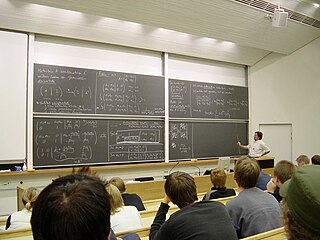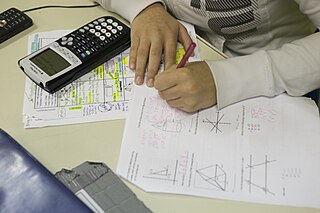Related Research Articles

In contemporary education,mathematics education—known in Europe as the didactics or pedagogy of mathematics—is the practice of teaching,learning,and carrying out scholarly research into the transfer of mathematical knowledge.
The National Science Education Standards (NSES) represent guidelines for the science education in primary and secondary schools in the United States,as established by the National Research Council in 1996. These provide a set of goals for teachers to set for their students and for administrators to provide professional development. The NSES influence various states' own science learning standards,and statewide standardized testing.
Principles and Standards for School Mathematics (PSSM) are guidelines produced by the National Council of Teachers of Mathematics (NCTM) in 2000,setting forth recommendations for mathematics educators. They form a national vision for preschool through twelfth grade mathematics education in the US and Canada. It is the primary model for standards-based mathematics.
Founded in 1920,The National Council of Teachers of Mathematics (NCTM) is a professional organization for schoolteachers of mathematics in the United States. One of its goals is to improve the standards of mathematics in education. NCTM holds annual national and regional conferences for teachers and publishes five journals.
Traditional mathematics was the predominant method of mathematics education in the United States in the early-to-mid 20th century. This contrasts with non-traditional approaches to math education. Traditional mathematics education has been challenged by several reform movements over the last several decades,notably new math,a now largely abandoned and discredited set of alternative methods,and most recently reform or standards-based mathematics based on NCTM standards,which is federally supported and has been widely adopted,but subject to ongoing criticism.
MathLand was one of several elementary mathematics curricula that were designed around the 1989 NCTM standards. It was developed and published by Creative Publications and was initially adopted by the U.S. state of California and schools run by the US Department of Defense by the mid 1990s. Unlike curricula such as Investigations in Numbers,Data,and Space,by 2007 Mathland was no longer offered by the publisher,and has since been dropped by many early adopters. Its demise may have been,at least in part,a result of intense scrutiny by critics.
The Interactive Mathematics Program (IMP) is a four-year,problem-based mathematics curriculum for high schools. It was one of several curricula funded by the National Science Foundation and designed around the 1989 National Council of Teachers of Mathematics (NCTM) standards. The IMP books were authored by Dan Fendel and Diane Resek,professors of mathematics at San Francisco State University,and by Lynne Alper and Sherry Fraser. IMP was published by Key Curriculum Press in 1997 and sold in 2012 to It's About Time.
Math wars is the debate over modern mathematics education,textbooks and curricula in the United States that was triggered by the publication in 1989 of the Curriculum and Evaluation Standards for School Mathematics by the National Council of Teachers of Mathematics (NCTM) and subsequent development and widespread adoption of a new generation of mathematics curricula inspired by these standards.
Thomas "Tom" Albert Romberg was Professor Emeritus of Curriculum and Instruction at the School of Education,University of Wisconsin–Madison,and former director of the National Center for Improving Student Learning and Achievement in Mathematics and Science,Wisconsin Center for Education Research.
Connected Mathematics is a comprehensive mathematics program intended for U.S. students in grades 6–8. The curriculum design,text materials for students,and supporting resources for teachers were created and have been progressively refined by the Connected Mathematics Project (CMP) at Michigan State University with advice and contributions from many mathematics teachers,curriculum developers,mathematicians,and mathematics education researchers.
Recall of facts is a value of education which is to be de-emphasized in reform of science according to new American national curriculum standards. Recall facts is often associated with rote learning.
Reform mathematics is an approach to mathematics education,particularly in North America. It is based on principles explained in 1989 by the National Council of Teachers of Mathematics (NCTM). The NCTM document Curriculum and Evaluation Standards for School Mathematics (CESSM) set forth a vision for K–12 mathematics education in the United States and Canada. The CESSM recommendations were adopted by many local- and federal-level education agencies during the 1990s. In 2000,the NCTM revised its CESSM with the publication of Principles and Standards for School Mathematics (PSSM). Like those in the first publication,the updated recommendations became the basis for many states' mathematics standards,and the method in textbooks developed by many federally-funded projects. The CESSM de-emphasised manual arithmetic in favor of students developing their own conceptual thinking and problem solving. The PSSM presents a more balanced view,but still has the same emphases.
Big Ideas Learning,LLC is an educational publisher in the United States. The company's headquarters is located in Erie,Pennsylvania. It publishes mathematics textbooks and instructional technology materials.

Susan Marie Kunze is a former second grade teacher in Bishop,California,situated in the foothills of the Sierra Nevada. She is an author of educational books and other resources,as well as a recipient of the 2008 Presidential Award for Excellence in Mathematics and Science Teaching.

Mathematics education in the United States varies considerably from one state to the next,and even within a single state. However,with the adoption of the Common Core Standards in most states and the District of Columbia beginning in 2010,mathematics content across the country has moved into closer agreement for each grade level. The SAT,a standardized university entrance exam,has been reformed to better reflect the contents of the Common Core. However,many students take alternatives to the traditional pathways,including accelerated tracks. As of 2023,twenty-seven states require students to pass three math courses before graduation from high school,while seventeen states and the District of Columbia require four. A typical sequence of secondary-school courses in mathematics reads:Pre-Algebra,Algebra I,Geometry,Algebra II,Pre-calculus,and Calculus or Statistics. However,some students enroll in integrated programs while many complete high school without passing Calculus or Statistics. At the other end,counselors at competitive public or private high schools usually encourage talented and ambitious students to take Calculus regardless of future plans in order to increase their chances of getting admitted to a prestigious university and their parents enroll them in enrichment programs in mathematics.
Sokikom (so-kee-kom) is a digital education program for elementary students to learn math through team-based games. Based in San Jose,CA,Sokikom was founded in 2008 by Snehal Patel.
Stonyhurst Southville International School is a learning institution in the province of Batangas and one of the Southville Global Education Network (SGEN) schools.
Marta Civil is an American mathematics educator. Her research involves understanding the cultural background of minority schoolchildren,particularly Hispanic and Latina/o students in the Southwestern United States,and using that understanding to promote parent engagement and focus mathematics teaching on students' individual strengths. She is the Roy F. Graesser Endowed Professor at the University of Arizona,where she holds appointments in the department of mathematics,the department of mathematics education,and the department of teaching,learning,and sociocultural studies.
The Mary P. Dolciani Award is an award established in 2012 by the Mathematical Association of America. The award recognizes a pure or applied mathematician with a record of distinguished contributions to K-16 mathematics education in the United States or Canada and comes with a $5,000 award. Examples of significant contributions include,but are not limited to,the development of K-16 mathematics curriculum,educational technology,or programs to improve teaching or teacher preparation. The prize is funded by a grant established by mathematician,educator,and author Mary P. Dolciani,who dedicated her career to improving mathematics education and is the author of several secondary- and college-level mathematics textbooks.
Douglas H. Clements is an American scholar in the field of early mathematics education. Previously a preschool and kindergarten teacher,his research centers on the learning and teaching of early mathematics,computer applications for mathematics teaching,and scaling up successful educational interventions. Clements has contributed to the writing of educational standards including the Common Core State Standards,the NCTM's Principles and Standards for School Mathematics and the NCTM's 2006 Curriculum Focal Points for Prekindergarten through Grade 8 Mathematics.
References
- 1 2 "About Me". Sybilla Beckmann, PhD. Retrieved October 10, 2022.
- ↑ Sybilla Beckmann at the Mathematics Genealogy Project
- ↑ "Sybilla Beckmann-Kazez". University of Georgia . Retrieved October 10, 2022.
- ↑ "Biography | Sybilla Beckmann". faculty.franklin.uga.edu. Retrieved 2016-11-05.
- ↑ "temrrg". temrrg. Retrieved 2016-11-05.
- ↑ "Sybilla Beckmann".
- ↑ Beckmann, Sybilla. "Mathematics for Elementary Teachers" (PDF).
- ↑ "TME – Volume 14 Number 1". math.coe.uga.edu. Retrieved 2016-11-05.
- ↑ "NCTM Store: Developing Essential Understanding of Functions for Teaching Mathematics in Grades 9-12". www.nctm.org. Retrieved 2017-04-05.
- ↑ "NCTM Store: Focus in Grade 1: Teaching with Curriculum Focal Points". www.nctm.org. Retrieved 2017-04-05.
- ↑ "Standard Algorithms in the Common Core State Standards" (PDF).
- ↑ "Mathematics for Elementary Teachers with Activities, 4/e by Sybilla Beckmann | Pearson". www.pearsonhighered.com. Retrieved 2016-11-05.
- ↑ "Why is Slope Hard to Teach? | On Teaching and Learning Mathematics". blogs.ams.org. Retrieved 2016-11-05.
- ↑ "Primary Mathematics Study on Whole Numbers" (PDF).
- ↑ "Sybilla Beckmann – AWM Association for Women in Mathematics". sites.google.com. Retrieved 2016-11-05.
- ↑ "Dolciani Award | Mathematical Association of America". www.maa.org. Retrieved 2020-09-27.